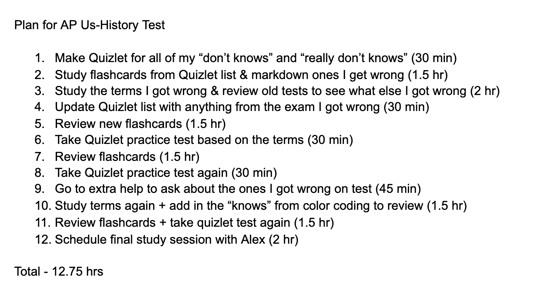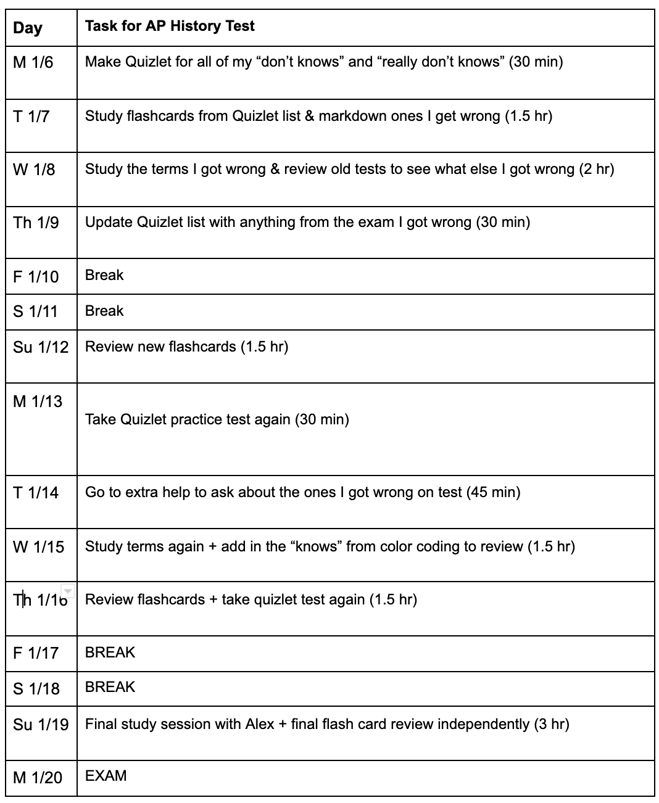Have you noticed that almost everyone seems to be talking about anxiety lately? It may be because mental health, in general, is becoming less stigmatized, but it’s also clear that anxiety is simply becoming more prevalent in our world. This is especially true for students.
According to the National Institute of Mental Health, nearly 1 in 3 adolescents aged 13-18 will experience an  anxiety disorder. In fact, the National Education Association is calling anxiety the “mental-health tsunami of their generation.”
anxiety disorder. In fact, the National Education Association is calling anxiety the “mental-health tsunami of their generation.”
And this problem doesn’t discriminate by age either - elementary school students are experiencing heightened anxiety, as well, and nearly two-thirds of college students report “overwhelming anxiety” - up from 50 percent in 2011.
Although unprecedented academic pressures, the prevalence of social media, and (of course) the pandemic are some of the biggest culprits fueling the anxiety epidemic, there’s actually one that’s often overlooked - Executive Function challenges. So why is this the case?
Day in and day out, students are expected to resist distractions, manage their time effectively, motivate themselves to start difficult assignments, keep their belongings organized, and stay on top of remembering massive amounts of information. All the while, they’re fighting an uphill battle against technology that’s been deliberately engineered to steal their attention and a brain whose Executive Functioning is years away from maturity.
In other words, many students are fighting an uphill battle to be successful - without proper support and strategies. And when these students fall victim to their Executive Function challenges, there are real consequences. They might fail to turn a paper in on time, resulting in whole letter grades being taken off (assuming a teacher or professor even accepts it all.) They might fail to study effectively for a midterm or final, resulting in hits to their grade-point average that may impact college prospects or class selection options. The examples are endless, but all of them have something in common: they also chip away at a student’s self-worth, making them believe that they’re “stupid” or incapable of success at any level.
This is where anxiety often enters the picture. When students have faced harsh consequences due to past experiences with large assignments or tests, they may start to fear those types of tasks. When this fear develops, students may enter a vicious cycle that ultimately increases their anxiety and decreases their effectiveness. Let’s look at an example and then explore how a few customized Executive Function strategies can help break the cycle and get students back on track.
Alejandro - A Case Study in Test Anxiety
Alejandro is a high-school junior nearing the end of his first semester, and every time he looks at his calendar, midterms get closer and the knot in his stomach becomes tighter.  For this year, Alejandro has pushed himself and taken on a few advanced classes to improve his transcript for college applications in the fall. In years past, he had been able to wait until the last minute to study for tests and still came out with pretty good grades. However, it turns out that it’s pretty hard to cram in a months' worth of honors physics and AP US History into one night of studying - and Alejandro is now banking on acing his midterms to get a passing grade for the classes. Yet, ever since receiving an F on his first history exam, Alejandro has found himself increasingly anxious every time a test arises in either class. Weeks before, his heart would race just from thinking about it, and if by some miracle he was able to force himself to sit down and study, he wouldn’t be able to retain anything he read from his textbook. This only worsened his anxiety, causing him to put off studying until the night before, where he’d discover that being on the verge of a panic attack makes it pretty hard to remember the essential government programs from FDR’s New Deal...
For this year, Alejandro has pushed himself and taken on a few advanced classes to improve his transcript for college applications in the fall. In years past, he had been able to wait until the last minute to study for tests and still came out with pretty good grades. However, it turns out that it’s pretty hard to cram in a months' worth of honors physics and AP US History into one night of studying - and Alejandro is now banking on acing his midterms to get a passing grade for the classes. Yet, ever since receiving an F on his first history exam, Alejandro has found himself increasingly anxious every time a test arises in either class. Weeks before, his heart would race just from thinking about it, and if by some miracle he was able to force himself to sit down and study, he wouldn’t be able to retain anything he read from his textbook. This only worsened his anxiety, causing him to put off studying until the night before, where he’d discover that being on the verge of a panic attack makes it pretty hard to remember the essential government programs from FDR’s New Deal...
Fast forward three months and some disappointing grades later, and Alejandro is already feeling that high-level anxiety two weeks out from his midterms. In his mind, if he fails this one, his college prospects are practically dead in the water and he’ll be struggling just to make it to his senior year.
A Connection Between Alejandro’s Test Anxiety & Executive Function
It’s clear that Alejandro has developed anxiety around test-taking, but that anxiety could be ameliorated by improving a few Executive Function skills - specifically organization, planning, and prioritizing. Without having a clear system to organize the information he needs to study the most for in each class, Alejandro is left trying to learn everything all at once instead of focusing on what’s most important for the exams. This problem is worsened by his lack of a plan around how he’ll actually break up the studying so he has time to learn, practice, and reinforce the information so that it sticks when he sits down for the test. If he’s able to do these things and still feels some level of anxiety, then he should experiment with some emotional regulation strategies to calm his nerves. So knowing what Executive Function skills are contributing to Alejandro’s anxiety and what might help, how can he proceed forward (and hopefully prevent that academic tailspin)?
1. Prioritize What Deserves Time
First and foremost, Alejandro should gather a study guide for each class's midterm and spend some time color coding based on what he knows and feels comfortable with, what he doesn’t know well, and what he doesn’t know at all (using a separate color for each level). Right off the bat, doing this exercise will make it clear which areas actually deserve study time vs. what he already is comfortable with. It’s a win-win no matter what the outcome is - either he finds out he knows more than he thought and can laser focus on the weaknesses, or he finds out that there’s a lot of areas to study but he knows exactly what they are. (Better than trying to read 10 textbook chapters, huh?)
2. Create a Study Plan
Now that it’s clear what needs the most attention, it’s time for Alejandro to make a study plan based on the insights from the color-coding. This plan will include both when to study as well as how to study by chunking small amounts of time throughout the two weeks before mid-terms to study for each exam. The best strategy we recommend for this is called Steps, Time, Mapping (STM). The first part of this strategy is to list all of the steps involved with studying. For Alejandro, this is where he might consider an online program (like Quizlet) to help him learn all the terms of his AP History midterm. Consider everything that would be helpful to do leading up to the test, including reviewing flashcards, doing practice tests, attending extra help, etc., and then list all of those steps. For each one, consider how long it might take and when all steps have been included, add up those totals. If the total looks light, then it could be worth adding extra steps. His list might look something like this:

Now that the list has been made, it’s time to map out the steps onto days leading up to the exam on a table. The left column will be the day, and the right will be the step (including how long it will take.) This is what that might look like for Alejandro.

Boom - everything is mapped out, Alejandro should be feeling much better. When students realize that there’s actually a process they can follow to achieve a goal, it’s so much easier to actually follow through on. When anxiety takes over, it can make things seem more daunting than they actually are and students might feel like there’s no time to study or that they’ll have to make massive sacrifices. However, as Alejandro’s plan shows, oftentimes there’s actually plenty of time if a student starts early, and this fact alone can reduce anxiety substantially. But what if that anxiety sticks around? What do you do then?
3. Practice Emotional Regulation
No matter the level of anxiety, emotional regulation techniques are a great way to calm down. Anxiety can really cloud our ability to think, which is especially problematic during test-taking!
One of our favorite strategies for calming down is called 5-Finger breathing and is super simple:
- Stretch out your hand like a star
- Get the pointer finger of your other hand ready to trace your fingers up and down
- Slide up each finger slowly - slide down the other side, starting with your thumb.
- Breathe in through your nose - out through your mouth as you slide
- Put it together and breathe in as you slide up and breathe out as you slide down
- Keep going until you have finished tracing your hand, and do the other if needed.
Alejandro should apply this during his study sessions and throughout the day leading up to his exam to keep his nerves at bay. Combine this with the study plan and those As are most certainly within reach.
The Takeaway
This is just one example of the kind of anxiety related to Executive Function skills that students can face, but the principles here still apply. If the anxiety your student is facing is rooted in Executive Function challenges, identifying the specific problem area, creating a plan to better manage it, and building emotional regulation strategies to help along the way are all excellent steps to take in order to make progress - both for the skill deficit and the anxiety.
If your student’s Executive Function skills or anxiety require more support, remember that working with a professional 1:1 is the ultimate intervention. Our coaches know how to customize tools to a student’s needs and guide them along their journey of personal growth. If the anxiety really seems unmanageable and rooted in issues beyond Executive Function challenges, consider working with a therapist or anxiety specialist. Regardless of the origin of your student's anxiety, there are support options that can help them become confident and successful.
--
 Our coaches help students manage academic anxiety. View our on-demand Open House to meet a sampling of our coaches and learn how they approach the common challenges facing students today.
Our coaches help students manage academic anxiety. View our on-demand Open House to meet a sampling of our coaches and learn how they approach the common challenges facing students today.
Photo by Jennifer Marquez and Elisa Ventur on Unsplash

